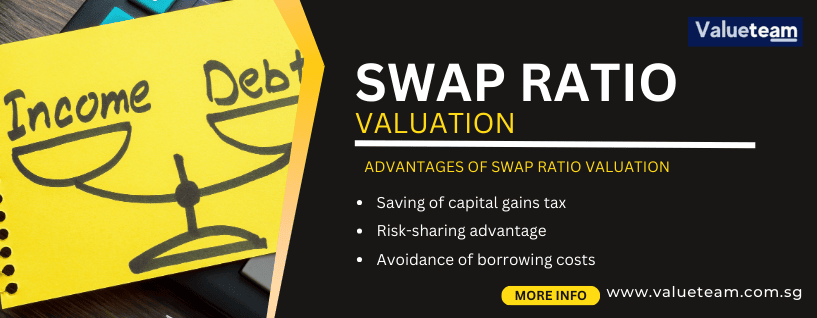Quick Contact
Need Help?
Please Feel Free To Contact Us. We Will Get Back To You With 1-2 Business Days.
info@valueteam.com.sg
+65 9730 4250
Download
Company White Paper
1.30 MB
Company Media Kit
1.22 MB
M&A Valuation Singapore
M&A Valuation in Singapore is a critical aspect of mergers and acquisitions that ensures fair transactions and mitigates risks. Whether you’re involved in the buy-side M&A valuation or the sell-side M&A valuation, understanding the true value of a company is essential for making informed decisions. At ValueTeam, we specialize in business valuation for mergers and acquisitions, offering independent M&A valuation services tailored to both M&A transactions and M&A due diligence valuation.
Accurate valuation of a company helps buyers and sellers navigate complex decisions and set realistic expectations. Our expertise in synergies in M&A valuation ensures that all potential benefits of an acquisition, such as cost savings or revenue growth, are properly accounted for. Whether you’re working on a cross-border M&A valuation or considering a valuation for share swap in M&A, we provide the comprehensive analysis needed to support M&A deal valuation in Singapore and beyond.
M&A Valuation, Finance team expert in the field of mergers and swap ratio valuation. We offer reliable mergers and swap ratio valuation services. Independent and sophisticated valuation solutions.
Understanding M&A Valuation
Mergers and acquisitions (M&A) represent transformative events for businesses, often reshaping industries and opening new avenues for growth. However, the success of any M&A transaction heavily relies on a thorough and accurate valuation process.
The Purpose of M&A Valuation
The primary purpose of M&A valuation is to determine the fair market value of a business involved in a merger or acquisition. Accurate valuation ensures that:
-
Buyers pay a fair price based on the target’s intrinsic value and future prospects.
-
Sellers receive appropriate compensation for the business they have built.
-
Shareholders and stakeholders have the information they need to approve or reject a proposed deal.
-
Regulators can verify that the transaction complies with statutory and financial reporting standards, such as Singapore’s Financial Reporting Standards (FRS 103).
M&A valuation is not merely about assigning a price to a business. It is a comprehensive exercise in risk assessment, financial forecasting, synergy estimation, and strategic planning. A well-grounded valuation builds trust between parties, minimizes disputes, and increases the likelihood of deal success.
Types of M&A Transactions in Singapore
Singapore offers a dynamic and business-friendly environment for a variety of M&A transaction structures. Each type of transaction has unique implications for valuation:
1. Statutory Mergers
In a statutory merger, two companies legally combine to form one surviving entity, with the other entity ceasing to exist. Assets, liabilities, and operations of the merged companies are consolidated.
-
Valuation Role: It’s crucial to assess the value of each company’s standalone business as well as potential synergies to determine fair merger terms.
2. Share Acquisitions
Here, the acquiring company purchases the shares of the target company, effectively taking over ownership and control.
-
Valuation Role: The value of shares must be carefully assessed based on both current market conditions and the future profitability of the target. Due diligence is essential to identify any hidden liabilities.
3. Asset Acquisitions
Rather than purchasing shares, the acquiring company buys specific assets (e.g., real estate, intellectual property, customer contracts) of the target business.
-
Valuation Role: The fair market value of each asset and liability being transferred must be individually assessed. This structure is often favored for isolating valuable assets without assuming unwanted liabilities.
Each transaction type affects deal structure, tax implications, and risk allocation — all critical factors to address during valuation.
Key Stages of an M&A Transaction and When Valuation is Required
M&A valuation is necessary at several critical stages throughout a transaction’s lifecycle:
1. Pre-Deal Stage: Strategic Planning and Initial Valuation
Before any formal offer is made, companies conduct preliminary valuations to:
-
Assess whether pursuing the transaction makes strategic and financial sense.
-
Set an initial offer range for negotiations.
-
Evaluate whether the potential synergies justify the acquisition premium.
2. Due Diligence Stage: In-Depth Valuation Analysis
During due diligence, a deeper analysis is carried out to verify:
-
The accuracy of financial statements.
-
The quality and sustainability of earnings.
-
Potential hidden liabilities or operational risks.
-
Tax, regulatory, and legal exposures.
Valuation at this stage may adjust initial estimates based on findings from due diligence investigations.
3. Negotiation Stage: Final Valuation and Deal Structuring
Armed with insights from due diligence, both parties refine the business valuation. This informs:
-
The final purchase price.
-
The structure of the transaction (cash deal, stock swap, earn-outs).
-
Specific deal terms, such as working capital adjustments or indemnity clauses.
4. Post-Transaction Stage: Purchase Price Allocation (PPA)
After deal completion, financial reporting standards such as FRS 103 require that the total purchase price be allocated among acquired tangible and intangible assets and liabilities.
-
PPA Valuation: Identifies goodwill, customer relationships, trademarks, technology, and other intangible assets requiring fair value measurement.
Additionally, post-acquisition impairment testing may be required periodically to assess the value of recorded goodwill or assets.

Why is M&A Valuation Important in Singapore?
In Singapore’s vibrant and competitive business landscape, mergers and acquisitions (M&A) are key strategies for growth, diversification, and market consolidation. However, the success of any M&A deal hinges on accurate, independent valuation. A robust M&A valuation not only determines the financial worth of a company but also influences critical decision-making throughout the transaction process.
Here’s why M&A valuation is so crucial in Singapore:
1. Determining a Fair Offer Price
An accurate valuation is essential to establish a fair and reasonable offer price for a business.
-
Buyers need to ensure they are not overpaying for the target company, factoring in current earnings, future growth prospects, and potential synergies.
-
Sellers require an objective valuation to defend their asking price and negotiate better terms.
Without proper valuation, there is a higher risk of paying a premium that cannot be justified post-acquisition or undervaluing a company and losing the deal to competitors.
2. Negotiating Deal Terms
Valuation directly impacts the structure and negotiation of deal terms, including:
-
The split between cash, stock, or other forms of consideration.
-
Earn-out structures based on future performance.
-
Adjustment clauses tied to working capital or debt levels.
A transparent valuation gives both parties a factual basis to negotiate from, helping to bridge valuation gaps and reduce misunderstandings or post-deal disputes.
3. Securing Financing
Whether the buyer funds the acquisition through debt, equity, or a combination of both, a credible valuation is crucial to securing financing.
-
Lenders require assurance that the purchase price is justified and that the deal will not expose them to undue risk.
-
Investors expect detailed valuation models that demonstrate the acquisition’s ability to generate attractive returns.
A strong valuation report boosts the buyer’s credibility and helps achieve better financing terms.
4. Informing Shareholder Decisions
For publicly listed companies in Singapore, M&A deals often require shareholder approval under regulations such as the Singapore Exchange (SGX) Listing Rules.
-
Shareholders rely on independent valuation reports to assess whether the deal is in their best interests.
-
Fairness opinions and valuation reports help shareholders make informed decisions based on objective financial analyses, not just management’s recommendations.
Proper valuation thus plays a vital role in maintaining corporate transparency and protecting shareholder rights.
5. Ensuring Regulatory Compliance
Singapore has strict legal and regulatory requirements surrounding M&A activities, especially for listed entities and cross-border transactions. Accurate M&A valuation ensures compliance with standards such as:
-
Financial Reporting Standards (FRS 103 – Business Combinations):
Requires companies to perform purchase price allocation (PPA) after a business combination, allocating the acquisition price among the identifiable assets, liabilities, and goodwill. -
Singapore Code on Take-overs and Mergers:
Overseen by the Monetary Authority of Singapore (MAS) and the Securities Industry Council (SIC), the Code mandates that independent valuations be conducted for related party transactions and mandatory offers to protect minority shareholders. -
SGX Listing Rules:
Transactions involving acquisitions or disposals above certain thresholds require detailed announcements, including valuation reports, to ensure full and fair disclosure to the market.
Failing to meet these regulatory standards can result in legal penalties, reputational damage, and even transaction cancellations.
M&A Valuation Methodologies in Detail
In M&A transactions, choosing the right valuation approach is critical to determining a company’s fair value. In Singapore’s dynamic market, where industries, regulations, and cross-border activities intersect, the correct methodology ensures both accuracy and defensibility in negotiations and regulatory disclosures.
Here’s an in-depth look at the key M&A valuation methods we use at ValueTeam, tailored for Singaporean transactions:
1. Discounted Cash Flow (DCF) Analysis
The Discounted Cash Flow (DCF) method estimates the intrinsic value of a business by forecasting its future free cash flows and discounting them to their present value using an appropriate discount rate (typically the weighted average cost of capital, WACC).
-
How it Works:
DCF involves building detailed financial projections (usually 5–10 years), estimating terminal value, and discounting these cash flows to today’s value. -
When It’s Used:
DCF is most useful when valuing companies with stable and predictable cash flows, such as mature businesses, or when public market comparables are scarce. -
Singapore Context:
DCF is favored for valuing technology firms, professional services companies, and privately-held businesses in Singapore where public comparables may be limited.
2. Comparable Company Analysis (Comps)
Comparable Company Analysis evaluates a company’s value relative to similar publicly traded companies operating in the same industry.
-
How it Works:
It involves selecting peer companies and applying valuation multiples such as EV/EBITDA, P/E, or EV/Sales to the target company’s financial metrics. -
When It’s Used:
This method is preferred when there are plenty of listed peers and market data is readily available. -
Singapore Context:
In sectors like real estate investment trusts (REITs), finance, healthcare, and consumer goods, where listed comparables are abundant, Comps provide market-aligned benchmarks for M&A valuation.
3. Precedent Transactions Analysis
Precedent Transaction Analysis (or Transaction Comps) assesses a company’s value based on prices paid for similar businesses in prior M&A deals.
-
How it Works:
Analysts identify comparable past M&A transactions, calculate valuation multiples, and apply these to the target. -
When It’s Used:
This method is powerful in heated M&A environments where acquisition premiums are expected. -
Singapore Context:
Particularly relevant in cross-border M&A and family business sales, where historical deal premiums in Singapore’s market provide real-world benchmarks.
Factors Affecting the Choice of Valuation Method in Singaporean M&A Transactions
In Singapore, the selection of the valuation method depends on several factors:
-
Availability of Reliable Data:
Private companies may lack sufficient market data, favoring DCF analysis. -
Industry Norms:
Certain sectors (e.g., real estate, finance) have established valuation conventions, like focusing on net asset value or dividend yields. -
Size and Stage of the Company:
Early-stage companies often have negative earnings, making DCF or revenue multiples more appropriate. -
Transaction Nature:
In friendly deals, detailed DCF analyses might be performed, whereas hostile takeovers often lean more heavily on comparables for quicker assessments. -
Cross-Border Elements:
Deals involving Singaporean companies and overseas buyers may require adjusting valuation approaches for different accounting standards, currency risks, and regulatory impacts.
Incorporating Synergies into M&A Valuation
Synergies—the additional value created by combining two businesses—are crucial in M&A valuations. These can include:
-
Cost Synergies:
Savings from consolidating operations, supply chains, or management. -
Revenue Synergies:
Opportunities to cross-sell products, expand market reach, or enter new markets. -
Singapore Context:
For example, merging two fintech firms in Singapore may unlock technology integration synergies that dramatically enhance valuation.
Approach:
The expected synergies are estimated separately and either:
-
Added to the DCF projections, or
-
Used to justify paying a premium over standalone valuations.
Importantly, buyers must discount synergies to account for execution risk and integration challenges.
Control Premiums and Discounts in M&A Valuation
When valuing companies for M&A transactions, it is essential to adjust for control premiums and minority discounts:
-
Control Premium:
Buyers often pay a premium over the market value to gain control of a company.
In Singapore, typical control premiums range between 20%–40% depending on the industry, market conditions, and strategic importance. -
Minority Discount:
If a minority interest (less than 50% ownership) is being valued, a discount is applied since minority shareholders have limited control over company decisions. -
Fairness Opinions:
In regulated transactions (e.g., related-party acquisitions under SGX rules), independent advisors in Singapore often issue a fairness opinion that explicitly considers whether the control premium is reasonable and justified.
Key Considerations in M&A Valuation
Valuing a business for a merger or acquisition in Singapore requires more than just financial modeling. Strategic decisions, regulatory nuances, and future potential must be considered to arrive at a fair and defendable valuation. Here are the core factors we evaluate at ValueTeam to deliver accurate and comprehensive M&A valuation services in Singapore.
1. Synergies in M&A Valuation Singapore
Synergies represent the added value that results when two companies merge, often becoming the cornerstone of acquisition justifications.
-
Types of Synergies:
-
Revenue Synergies: Increased sales opportunities through cross-selling, new markets, or enhanced brand reach.
-
Cost Synergies: Operational efficiencies such as shared resources, eliminated redundancies, or supply chain optimization.
-
-
How We Incorporate Synergies: At ValueTeam, we build scenario-based forecasts to reflect both the expected and best-case synergy outcomes. These are integrated into Discounted Cash Flow (DCF) models and used to adjust enterprise value in both buy-side and sell-side M&A valuation in Singapore.
-
Caveat:
Synergy estimations must be grounded in reality—overestimating them can lead to overvaluation and acquisition failures.
2. Risk Assessment in M&A Valuation
Every M&A transaction involves inherent risks that can affect a company’s valuation.
-
Types of Risk Considered:
-
Financial Risk: Volatility in cash flows, debt levels, customer concentration.
-
Operational Risk: Key person dependencies, system integrations, supply chain vulnerabilities.
-
Legal & Regulatory Risk: Pending litigations, compliance issues, or anti-trust scrutiny.
-
-
Valuation Implication: These risks are embedded into discount rates, control premiums, or valuation adjustments—ensuring buyers don’t overpay and sellers fully understand their position.
-
Singapore Insight:
We often conduct sensitivity analyses for industries prone to policy shifts (e.g., healthcare, education, and finance) under Singapore’s regulatory frameworks.
3. Due Diligence: Role of Valuation in the Process
M&A valuation and due diligence go hand in hand. A valuation without due diligence is speculative; due diligence without valuation is incomplete.
-
How We Integrate Valuation with Due Diligence:
-
Validate key assumptions: growth rates, margins, and working capital needs.
-
Identify red flags: understated liabilities, inflated revenues, or misclassified assets.
-
Adjust valuation models: in response to findings from legal, tax, and operational reviews.
-
-
Outcome:
You get an independent M&A valuation in Singapore that’s rooted in facts, not forecasts.
4. Purchase Price Allocation (PPA) under FRS 103 in Singapore
After an acquisition, companies must allocate the purchase price to acquired assets and liabilities. This is mandated by FRS 103 (Business Combinations) under Singapore Financial Reporting Standards.
-
Why PPA Matters in M&A Valuation:
-
It ensures transparency in financial reporting.
-
Helps assess the impact of intangible assets and goodwill on future earnings.
-
Supports compliance with IRAS and ACRA regulations.
-
-
Our Approach: We conduct detailed valuations of intangible assets, tangible fixed assets, and liabilities. The residual amount is attributed to goodwill, which may be subject to future impairment testing.
-
Common Intangibles Valued:
-
Customer relationships
-
Technology and IP
-
Brand names
-
Non-compete agreements
-
5. Valuing Intangible Assets in M&A
Intangible assets often drive value in modern M&A deals—especially in tech, media, and service-oriented industries.
-
Challenges: These assets may not appear on the balance sheet and are difficult to price without specialized models.
-
Valuation Methods:
-
Relief-from-Royalty Method: For trademarks and IP.
-
Multi-Period Excess Earnings Method (MPEEM): For customer relationships.
-
Cost Approach: For internally developed but uncommercialized technology.
-
-
Singapore Consideration:
The Accounting and Corporate Regulatory Authority (ACRA) mandates clear disclosure and audit readiness for intangible valuations post-acquisition.
6. Cross-Border M&A Valuation Considerations
Singapore is a hub for regional and international M&A activity. Cross-border deals bring added complexity:
-
Key Factors:
-
Currency Fluctuations: Affect cash flow projections and valuations.
-
Tax Jurisdiction Differences: Impact net income and free cash flows.
-
Legal & Regulatory Discrepancies: Affect asset ownership, employment laws, and deal structure.
-
-
Our Expertise in Cross-Border M&A Valuation Singapore:
-
Adjust for foreign exchange risk and inflation.
-
Normalize financials for international accounting standards.
-
Coordinate with legal and tax advisors across jurisdictions.
-
Why Choose ValueTeam for Your M&A Valuation in Singapore?
We are a specialized valuation company providing end-to-end assessment services. Our team has extensive experience in the field of valuation. So, expect the following;
✅Deep Expertise in Singapore’s M&A environment
✅ Proven track record across buy-side and sell-side mandates
✅ Independent, defensible, regulator-accepted valuations
✅ Comprehensive transaction advisory, from early-stage screening to post-deal compliance
✅ Focus on maximizing value while minimizing risk
Whether you are acquiring, merging, selling, or restructuring, ValueTeam’s M&A valuation services provide the strategic clarity and financial confidence you need to achieve a successful outcome.
Talk to our M&A valuation experts today and take the first step toward a well-informed, successful transaction.

Innovative M&A Valuation Services
Valueteam is a trusted name for independent valuation and business advisory solutions in Singapore. Connect with us today!

Our Valuation Methodologies
We integrate proper valuation methods to achieve detailed analytic insights, accomplishing our clients’ business requirements.

Hassle-Free Share-Swap Ratios
We’ll give you access to hassle-free share-swap ratios whether it’s for restructuring or acquisition.
Your Business Needs to Stay Dynamic in a Complex Ecosystem
M&A Valuation Services
The expert financial professionals at the Value team offer knowledgeable, transparent, and substantial Mergers and Swap Ratio valuation solutions to the target company. This provides a robust foundation for your negotiations. We assist our clients by providing them with personalized valuation services both for restructuring and negotiations with transaction counterparties. We ensure that the package they choose fits their needs.
Our core expertise lies in delivering independent, defensible, and detailed M&A valuations that serve as a foundation for negotiations, financing, regulatory submissions, and shareholder approvals.
-
Due Diligence Support: Valuation plays a critical role during the M&A due diligence process.
We conduct rigorous financial analysis to assess the true value of the target company, uncover hidden risks, evaluate key value drivers, and model multiple scenarios.
Our due diligence valuation highlights issues such as revenue sustainability, customer concentration, contingent liabilities, and working capital requirements—ensuring you have a full picture before proceeding. -
Purchase Price Allocation (PPA): After an acquisition, Singapore Financial Reporting Standards (FRS 103 – Business Combinations) require a proper allocation of the purchase price among tangible and intangible assets.
Our team specializes in performing detailed PPA analyses, ensuring compliance with local accounting standards, while helping you accurately recognize goodwill, intangible assets (e.g., brand names, customer relationships, technology), and deferred tax liabilities.
Fairness Opinions for M&A Deals
In many Singapore M&A transactions—especially for listed companies or related-party transactions—a Fairness Opinion is critical.
We provide independent Fairness Opinions to boards of directors, special committees, and shareholders, offering an unbiased view on whether the proposed transaction is fair from a financial perspective.
Our fairness opinions strengthen corporate governance, protect directors against legal liabilities, and reassure stakeholders that the deal terms are equitable.
Key scenarios where our fairness opinions add value:
-
Mergers or consolidations
-
Management buyouts
-
Related-party acquisitions
-
Privatizations or delistings
-
Complex share swap deals
Analysis of Swap Ratios, EPS Accretion/Dilution, and Deal Impact
Valueteam provides effective swap ratio valuation services by deeply analyzing company and industry-related financial and non-financial data for a smooth Mergers and Acquisitions (M&A) transaction. These include book value, earnings per share, profits after tax, and other factors. We will provide a detailed analysis of the swap ratio so that you enter a deal at a fair value.
Accretion/Dilution is an important corporate finance concept associated with mergers & acquisitions. Our team of valuation experts will deeply analyze EPS accretion and dilution before a transaction. This will ensure that our clients can assess the outcomes a merger can have from the acquirers’ perspective. It is helpful in achieving a competitive edge in an M&A deal.
For transactions involving share swaps, determining the correct swap ratio is crucial to maintain fairness between the merging parties.
Our team conducts detailed analysis to ensure that the proposed swap ratio reflects the relative standalone values of the entities involved, adjusted for synergies, control premiums, or minority discounts where applicable.
We also evaluate Earnings Per Share (EPS) accretion or dilution—a key metric for public companies considering M&A.
Through sophisticated financial modeling, we project how the transaction will impact EPS under various integration scenarios, helping shareholders and boards make informed decisions.
Our EPS and swap ratio analysis includes:
-
Pro forma combined financial modeling
-
Sensitivity analysis to different synergy realization scenarios
-
Assessment of short-term dilution versus long-term accretion
-
Recommendations on deal structures to optimize shareholder value
STEPS FOR A SUCCESSFUL SWAP-RATIO VALUATION
A successful swap-ratio valuation can be accomplished via the following steps:
POTENTIAL ACQUIRERS
Many companies initiate the company acquisition process very late. It is usually only after the growth curve of their company has flattened or when their competitors have entered the market. By then, the value of their company would have lessened.
The most suitable time for acquisition is at the beginning stages of the growth curve or when the product is introduced in the market. At this stage, CEOs, CFOs, and Corporate Development executives can initiate the discussion with the seller in the initial growth stages of the company. Once you start the acquisition process, you should establish relationships with potential buyers.
Such associations can be created via joint development agreements, private label agreements, or reseller agreements. Besides, companies engaged in series of acquisitions usually take it up for the long-term and planned gains, such as bridging a gap in their portfolio, developing new markets, or gaining enhanced interactions.
PARTNERS NEED
Most sell-side companies get a due diligence checklist from the buyer and only then consider how to offer credentials to demonstrate their company’s value. Instead, they should instantly think of ways to combine their information and decide the tools they would use to share their company’s confidential information.
It will give you some breathing space in the case of any exposed loose ends. Thus, the main aim of companies should be to prevent sudden revelations in the later stages of acquisition which might impact the valuation of the business.
VALUATION DRIVERS
To substantiate your companies valuation to the buyer after the acquisition, you should first understand what benefit your company will offer to the acquirer. Usually, the acquirers will be looking for the following attributes, and hence, you should concentrate on these qualities to come into the radar of prospective buyers who will pay the correct valuation for your business:
Robustness – market share, sales, team
Concepts – IP, patents, branding, trademarks
People – Investors, workforce, customer base, environment, media
Business rivalry – market advantage, implementation advantage, sector growth.
Thus, when the buyers notice that you are well-prepared for the acquisition, they will realize that you are in control of your business, and you are target-centric, and you have been planning for a successful transaction.
VALUATION DATA
Based on your internal team expertise, you may also engage a valuation expert to provide you a valuation and swap-related data and analysis. In most M&A dealings, the inclusion of valuation experts such as Valueteam can add a great deal of value to the transaction.
When looking out for valuation experts, you should choose who specialize in your industry and those with remarkable experience in similar dealings. Besides, whether your deal size is big or small, you can consider hiring valuation professionals with significant expertise to gain the most benefits from an M&A process.
We at Valueteam can customize our packages based on your deal size and valuation needs at the most competitive rates. Once you team up with us, you will notice that your M&A team will have a positive collaboration and that all team members will contribute significantly to the M&A transaction. Thus, your company will be able to get the best valuation.
OUR OTHER SERVICES
The Role of a Financial Advisor in M&A Valuation
Why ValueTeam Is the Trusted Partner for M&A Valuation in Singapore
HOW DOES VALUATION HELP YOUR BUSINESS?
Benefits of valuing a business
Business valuation can help you to buy or sell a business with ease, discuss better terms with the buyers or sellers of the company and choose the right time for selling or buying a business.
Stimulate Growth
Periodic valuation is a good practice because it helps you evaluate and appraise your business functioning; uncover business areas that need improvement, and quickly raise capital for your business.
ADVANTAGES OF SWAP RATIO VALUATION
Risk-sharing advantage
- In a share swap, the stakeholders of the target company will also be the stakeholders of the acquiring company. Hence, the threats and advantages of the anticipated collaboration from the acquisition will be divided among both companies.
- As a consequence of a broader reach and distribution network, both the target company and the acquiring company will be advantageous. In addition, there are also decreased distribution costs for the products and services from the firms.
Avoidance of borrowing costs
- In a share swap, the acquiring company’s borrowing costs are saved because there is no cash expenditure for the buyer.
- The buyer can thus utilize this cash to make investments in the target company or other buyouts.
Saving of capital gains tax
- When stakeholders of an acquired company are awarded shares of the acquirer company in a share swap, it is not counted as a share transfer.
- Therefore, capital gains tax will not apply to the stakeholders of the acquired company.
WHAT ARE THE METHODS FOR VALUATION IN MERGERS AND ACQUISITIONS?
WHAT IS THE IMPORTANCE OF VALUATION IN M&A TRANSACTIONS?
WHAT IS THE ROLE OF SWAP RATIO IN MERGERS AND ACQUISITIONS?
WHAT IS A SWAP RATIO?
WHAT IS THE GENERAL M&A PROCESS?
VALUATION EXPERT
We specialize in the assessment of different companies across all sectors and business cycle stages.
STRATEGIC PLANNING
Valueteam can help you in strategically planning your business goals and objectives.






